My Memories of M A Jinnah
Category:
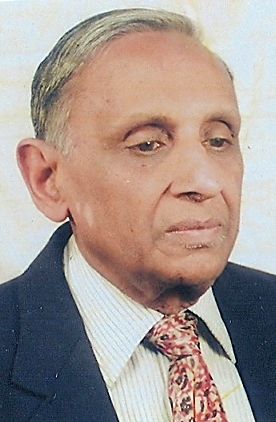
R C Mody is a postgraduate in Economics and a Certificated Associate of the Indian Institute of Bankers. He studied at Raj Rishi College (Alwar), Agra College (Agra), and Forman Christian College (Lahore). For over 35 years, he worked for the Reserve Bank of India, where he headed several all-India departments, and was also Principal of the Staff College. Now (in 2010) 84 years old, he is busy in social work, reading, writing, and travelling. He lives in New Delhi with his wife. His email address is rmody@airtelmail.in.
During pre-independence days, there was a craze among youngsters to boast about how many leaders of the independence movement they had seen. Everyone wanted to excel the other in this regard. Not only the number but also the stature of the leader mattered. I had little to report. I had grown up and spent my early boyhood in Alwar, a Princely state. Leaders of national stature rarely visited Alwar, as the freedom movement was confined largely to British India. I had not seen practically any well-known leader in person till I was in my mid-teens.
When I went to college in Agra in July 1942, I hoped to meet national leaders because Agra was a leading city of British India. Alas! The Quit India movement commenced within a month. And the British government responded by locking up all the prominent leaders whom I looked forward to see. For months, we were not even aware where they were confined.
One morning in April 1943, the newspapers reported that Mohammed Ali Jinnah was on a visit to Agra that day. Normally, I would not have been excited. I had read about Jinnah having been called an "Ambassador of Hindu-Muslim Unity". But, that was much earlier, and appeared unbelievable in the face of what he had since become. Since 1937 (when I started reading newspapers), I had read only his fire-spitting statements, preaching hatred, and bitterly attacking the leaders whom I revered. In late 1939, he had asked Muslims to celebrate the resignations of Congress Ministries which held office in 8 (out of 11) provinces as a "Day of Deliverance and Thanksgiving". A few months later, in March 1940, he demanded the partition of India and the creation of a separate country for Muslims.
Regardless, however, of his views and pronouncements, I was still interested in seeing a national figure in person. I asked my friends in the hostel in which I lived, but no one appeared interested. I would have to go by myself.
After making enquiries, I found out that Jinnah had come to Agra as a lawyer to plead a case in the court of a local Magistrate. Jinnah's client was an Army contractor (incidentally a Hindu) who was accused of trying to bribe a British Colonel in the Indian Army. The court was in the Cantonment, a few miles away. I skipped my classes, and went on my bicycle, all the way.
There were no restrictions on entry into the court - security checks were unknown then. The courtroom was not crowded, and I found myself face to face with the man whom I had seen only in pictures till then. He was dressed immaculately, in a western style silk suit, sporting a monocle. I recognized the Magistrate too. I had seen him resisting (not unkindly) a demonstration of which I was a part eight months ago, in August 1942, to protest against the arrest of our leaders. He and the accused (on bail) were also very well dressed, and the three of them made the otherwise drab courtroom look bright. In the courtroom, there was gossip in hushed voices that the accused had engaged Jinnah, an expensive lawyer from far away Bombay (now Mumbai), because the Magistrate was a Muslim.
I watched Jinnah till lunch time, arguing his client's case meticulously. He spoke in a low voice to the Magistrate seated at an elevated level across the usual wooden barricade of a courtroom. There was no oratorical flow in Jinnah's speech, nor any display of the rhetoric for which he was famous.
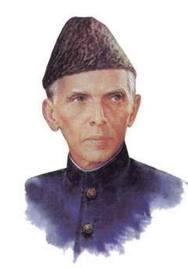
But it was a different Jinnah in the evening, when he came to address a public meeting in Baker Park (now Subhas Park) arranged by the local Muslim League. I came to this meeting with a number of fellow hostellers. This time Jinnah wore a sherwani and a fur cap. There was a fairly large crowd, mostly Muslims, carrying banners welcoming Jinnah. He started his speech in Urdu but switched quickly to English, seeking forgiveness for his ‘bad Urdu', saying that he unfortunately had not acquired sufficient proficiency in the language that was likely to be the lingua franca of their dream country, Pakistan.
I found his speech in English impressive in content, pronunciation and delivery. In his Urdu speech, I remember, Jinnah had referred to Jawaharlal Nehru, as a "Mashhoor (well known) Hindu leader". During question time after his speech, when some one asked Jinnah why he called Nehru a ‘Hindu' leader even though he was modern and irreligious, Jinnah quipped, "An arch Brahmin, with a veneer of Westernism". The meeting ended amidst tumultuous shouts of "Pakistan Zindabad". I remember wondering how the Muslims of Agra would benefit from the creation of Pakistan, which would be several hundred miles away from Agra. (Many years after the creation of Pakistan, it was realised that it was more the outcome of deliberations in drawing rooms of UP and Bombay than of any agitations on the streets of Karachi or Peshawar, which became part of Pakistan, while UP and Bombay did not become part of Pakistan.)
Thus ended my two encounters on a single day with a leader of national stature. I recall writing an elaborate report on them in a letter to my father, from whom I had heard a lot about Jinnah.
One and a half year later, by September 1944, when I had moved from Agra to Lahore for my studies, Jinnah and his demand for Pakistan had started attracting national attention more than ever before. It started particularly with the Gandhi-Jinnah talks at Bombay towards the end of this month. For a week or more, the country was engrossed totally in the newspaper reports on these talks. The extent to which it had impacted Indians then can be judged from the following episode, which I still remember 67 years later.
In Lahore, I was staying with some relatives. Early one morning, when I was sleeping still on the sprawling lawn of my host's home, I was woken up by the shouts in English of the westernised daughter-in law of the house, rushing with a newspaper in hand, "Papa, Gandhi-Jinnah talks have failed." The family was stunned and spent the entire morning discussing the news. (The justification for the apprehensions that gripped the family that morning, I understood, when in less than 3 years, Lahore became part of Pakistan and they had to leave the beautiful home in which they hosted me.)
While going through the letters exchanged between the two leaders, released after the failure of the talks, I read that Gandhi had addressed Jinnah as Quaid-e-Azam (great leader). I do not recollect any one using this appellation for Jinnah earlier. Perhaps it became more common after the creation of Pakistan.
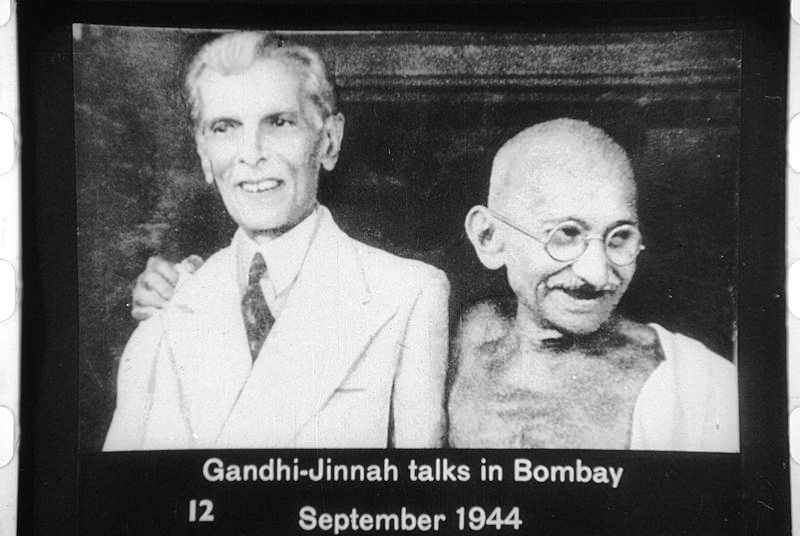
A few months later in June 1945, when we dispersed for the summer vacation, I was in Shimla where the first Shimla conference was convened that month by the Viceroy, Lord Wavell. The principal participants were the Indian National Congress, led by Maulana Azad, and the Muslim League, led by Jinnah. I ultimately the got long awaited opportunity to see in person Gandhi as also some of our other top national leaders, who had been released from prison a few days earlier, and had come to Shimla for the conference, filling up the void ( indicated at the commencement of this narrative) which I was carrying for many years.
This time, Jinnah was not on my mind. But, on the opening day of the conference when I was standing in front of the Cecil Hotel watching leaders coming out of the Viceregal Lodge during the lunch hour (Now, I wonder why the Viceroy could not have served them lunch. Was it Imperial arrogance?), a hand driven rickshaw stopped just in front of me, and Jinnah alighted from it. I could not help watching him from as close quarters as I did in the courtroom in Agra.
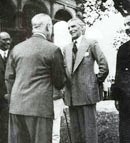
He was attired dandyishly, wearing a butler (double toned) pair of shoes and a sola (sun) hat. With a wry smile, he agreed to pose for a photograph to a youngster holding a camera. But when another boy extended his autograph book towards him, Jinnah declined disdainfully and walked into the hotel.
Click here to see Lord Wavell welcomes Indian Political Leaders in Simla (1945)
This was the last time I saw Jinnah in person. I learnt from newspapers the next day that during the opening session of the Conference in the Viceregal Lodge, Jinnah declined to shake hands of Congress President Maulana Azad, a Muslim, when they came face to face.
I never saw Jinnah in person again after that day in June 1945. But, I kept following his activities and statements closely through newspaper reports till 7th August 1947 (date confirmed by my 1947 diary), when he, as Governor General (designate) of Pakistan, boarded an aircraft at the Delhi airport for Karachi. As he was leaving, I remember him tersely wishing India "Good luck".
There is unfortunately no reason to believe that he really meant India "Good luck". During the few months intervening between the acceptance of his demand for Pakistan and his departure for Karachi, I do not remember a single occasion when he said any thing that smacked of a feeling of ‘forgive and forget'. On the other hand, his speeches continued to be, as before, bitter, taunting and rhetorical.
Once, on 13th June 1947, Nehru and he came face to face at a meeting, chaired by Lord Mountbatten, on the future of Princely states. Nehru accused the outgoing British officers of trying to ‘Balkanise' India by encouraging the Princes to declare themselves independent. This was an issue on which the interests of India and Pakistan were identical. However, far from supporting Nehru, Jinnah stood up indignantly, pushed back his chair and expressed his desire to quit the meeting rather than listen to ‘bombastic' speeches making unjustified accusations against British officers. He made it clear that he stood by right of the Princes to remain independent.
In my opinion, such a stand was motivated not by his belief in the right of Princes to be independent, but by a desire to further divide India by inciting Princes in general, and the Nizam of Hyderabad and the Nawab of Bhopal in particular, against acceding to India. Later, after Pakistan came into being, Jinnah not only merged Princely states (Kalat almost by force) into Pakistan territory but his troops invaded neighbouring Kashmir, in October 1947 when its ruler was still considering the future of his state.
Whenever Jinnah said that there was nothing common between Hindus and Muslims, I used to remember the way in which we used to jointly celebrate Krishna Janmashtami and Prophet Mohammed's birthday in school. But all these ended, even before the Partition, as the Muslim youth started falling prey to his propaganda.
Another aspect of his personality, which we observed till the end, was his arrogance towards not only his political opponents but also his own followers. Once he was asked, while still in India, as to who besides him had contributed to the attainment of his goal of Pakistan. He replied, "My type-writer or may be my stenographer."
In retrospect, I feel that Jinnah could have used the period between the announcement of the Partition Plan (June 3, 1947) and his departure from India (August 7, 1947) to mend fences with Indian leaders and create goodwill. Perhaps this could have laid the foundation of friendship between the two emerging nations. But alas, that was not to be.
Hope was once again revived when we read about his often-quoted speech (see excerpts here) to the Pakistan Constituent Assembly on 11th August 1947. He talked of no discrimination on the basis of religion in Pakistan. Some thought that the ‘Ambassador of Hindu-Muslim unity' in him had re-emerged after 30 years.
I kept waiting to see what Jinnah would do to implement this promise. But I heard only of millions of non-Muslims being butchered and fleeing their homes and hearths in Pakistan, after he delivered this speech. He did nothing to stop them from leaving. He never came anywhere near addressing the large kafilas (convoys) marching towards India, and ask the marchers not to go, assuring them safety and security. He did virtually nothing to implement his tall promise.
On the evening of 30th January 1948, I had rushed to Birla House in New Delhi, on hearing of Gandhiji's assassination there. I could not go beyond the gate on which Nehru was standing. After listening to his tearful address, in which he announced the plan for the funeral next day, during the long tonga drive to my residence, many memories and ideas passed through my young mind. One of them was the idea that some good might come out of the great tragedy that India had suffered. Gandhiji had sacrificed his life for protecting the Muslim minority in post-partition India. He had also insisted on India paying Rs 55 crore due to Pakistan, which India had withheld as Pakistan was waging war against it in Kashmir. I thought that Gandhiji's passing away in these circumstances may bring a change of heart in Jinnah, and he may land up in Delhi the next day to mourn him - which could have ended the prevailing bitterness between the two new nations. But, it turned out to be only an empty dream of an immature mind. Jinnah was made of sterner stuff. All he did was to send a tersely worded condolence message, calling Gandhi "a great Hindu leader".
When we got the news of Jinnah's death in September 1948, some of us were sorry. The lingering hope that he might still re-appear one day in his earlier avtar as an Ambassador of Hindu-Muslim Unity or of Indo-Pak amity (in the new reality) got finally extinguished. Years later, there were rumours that during his last days, which he spent in Ziarat, (Baluchistan) he told one of his physicians how much he missed his days in Bombay, and that when he returned to Karachi, he was going to call "Jawaharlal" and tell him "Let us start all of it afresh". The rumours have never been confirmed. In any case, Jinnah returned to Karachi only a few hours before his death, probably in a semi-conscious state.
Any narration of memories of Jinnah in India would not be complete without referring to the two houses he left behind, one in Bombay and another in Delhi. Both homes are epitomes of his luxurious life style. I learnt from newspapers soon after he left India that he had sold his Delhi home to a controversial Indian industrialist. Later, the Government of India acquired this house under the Evacuee Properties Act. I did not care to know what happened to it after that until a few years ago when a magazine published pictures of one of the most elegant houses in New Delhi's Lutyen's Bungalow Zone, currently the home of the Ambassador of an EEC country. Since then, whenever I pass by it, I try to catch a glimpse of it.
The flagship was the Jinnah House in Malabar Hills in Bombay. Like Anand Bhawan in Allahabad (residence of the Nehru family), Jinnah House of Bombay was one of the places where history was made. I had often seen it in pictures and films. Gandhiji had gone there to meet Jinnah in September 1944 for the Gandhi-Jinnah talks discussed above (see here). Once Nehru was seen ascending its steps in 1946 when he went there to meet Jinnah and invite the Muslim League to join him in forming the Interim Indian Government. Nehru was received only by Jinnah's secretary\; Jinnah himself came out after some time to turn down Nehru's request, though the League did join the Interim Government later, as a hostile force to make it unworkable. Years later, Sri Prakasa, India's first envoy to Pakistan, wrote in his reminiscences that Jinnah, now Governor General of Pakistan, once turned sentimental about this house. He told Sri Prakasa, "It is my heart, please, ask Jawaharlal, to keep it properly and not break my heart."
Jinnah was dead by the time I first went to live in Bombay and could manage to have a look at this house. It was a magnificent edifice. Today, its ownership is controversial, and it is decaying fast. How I wish that this house, which in any case is a part of our history, is preserved for posterity, the way we have preserved monuments left behind by the British.
Epilogue
What is Jinnah's legacy? This remains a controversial issue, part of an ongoing debate.
I think that from 1937 onwards his overarching objective was to "save" undivided India's 9 crore Muslims from "Hindu Raj" and allow them to lead a life of dignity, in event of the British leaving India. To achieve this, he propounded the two-nation theory, and demanded a Muslim Pakistan to be carved out of India. He got it. But, did he succeed in achieving his overarching objective?
The 9 crore Muslims of 1947 have by now increased in number to just over 48 crore. Ironically, over 16 crore of them, over 33 %, continue to live in India under what Jinnah called "Hindu Raj", from which he wanted them to be emancipated, making India still the home of the second largest number of Muslims in the world, after Indonesia. This, more than anything else, demonstrates the fallacy of Jinnah's view that Muslims needed a separate country to escape Hindu persecution.
A little less than 16 crore Muslims live in Bangladesh. Their fathers and grandfathers were swayed by the two-nation theory and they helped Jinnah to create Pakistan. But, they were soon disillusioned and fought a bloody war to get out of it, and that too with India's help.
About 16 crores Muslims live in what is Pakistan today. Many of them are descendants of those who migrated from India in the hope of a better life. But they are still treated as outsiders: they are called Muhajirs (Urdu-speaking immigrants from India) and often discriminated against. I have seen their kith and kin in India, seeking visitors' visas, in order to pay them a visit, being harassed and humiliated at the Pakistan High Commission in Delhi. Ironically, the High Commission treated me with due courtesy when I went there to apply for my visa to visit Pakistan in the 1990s.)
Jinnah had visualized Pakistan as a modern, forward-looking democratic state. Today, it looks a far cry from the Pakistan Jinnah had dreamt of. Some young Pakistani writers go so far as to say that the country is still in search of an identity.
Finally, India and Pakistan have still not been able to find a way to live peacefully with each other. No doubt, Jinnah cannot be held responsible for what happened after his death. But, I feel that the divisiveness that Jinnah preached still continues to divide India and Pakistan.
In this sense, Jinnah continues to live even to day, over 63 years after his death, through the spirit of divisiveness that he has left behind.
_______________________________________
© R C Mody 2011
Videos and photos of M A Jinnah from the Internet
Quaid-e-Azam's speech to Pakistan's Constituent Assembly August 11, 1947
Quaid-e-Azam Muhammad Ali Jinnah August 15, 1947
Quaid-e-Azam's address at a Mammoth Public Meeting in Lahore October 1947
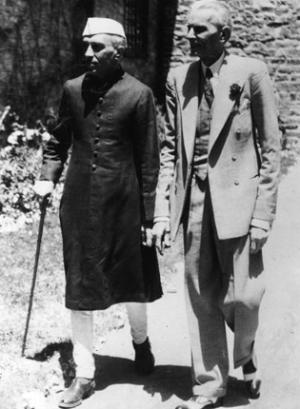
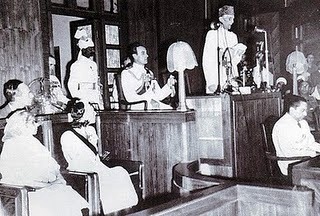
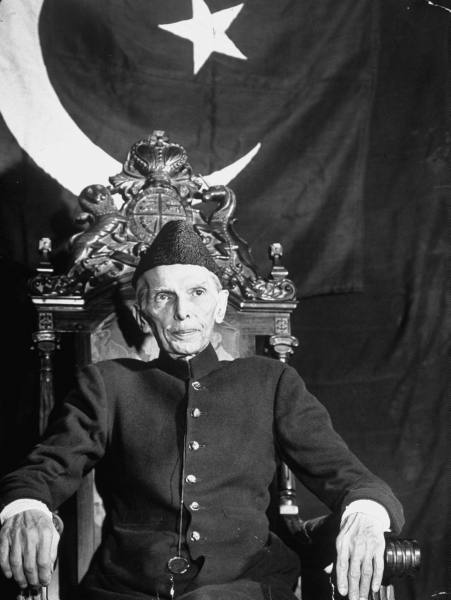
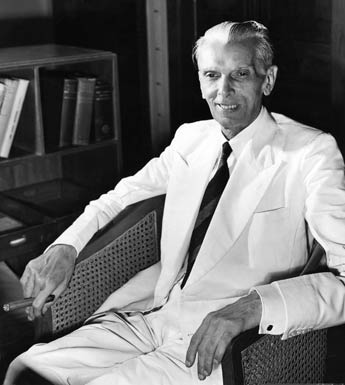
Videos and photos of Shimla conference
Lord Wavell welcomes Indian Political Leaders in Simla (1945)
News report on Shimla conference
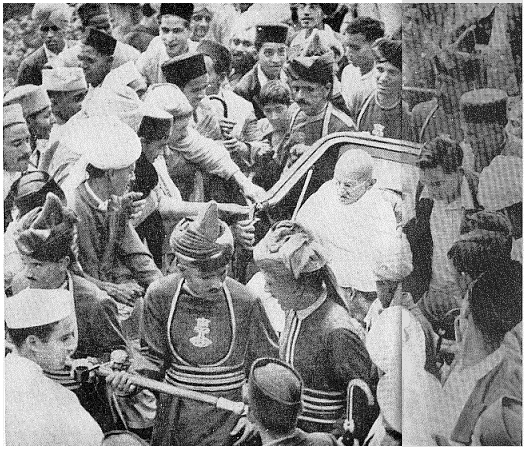
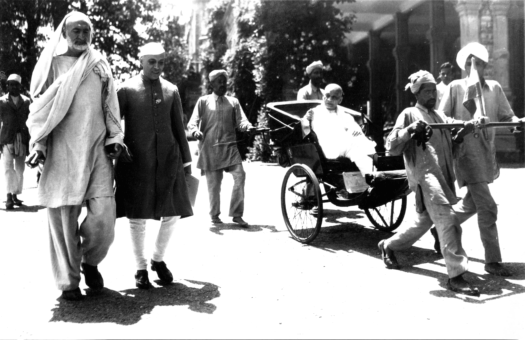
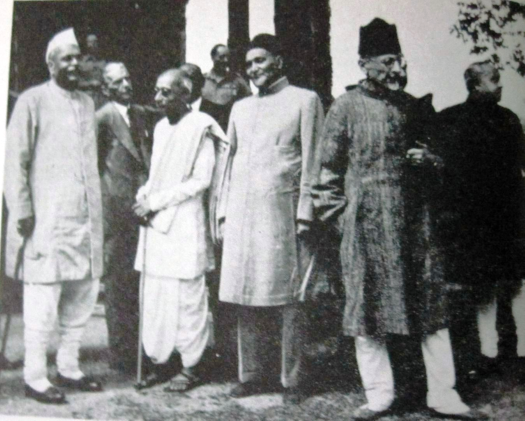
Comments
Add new comment